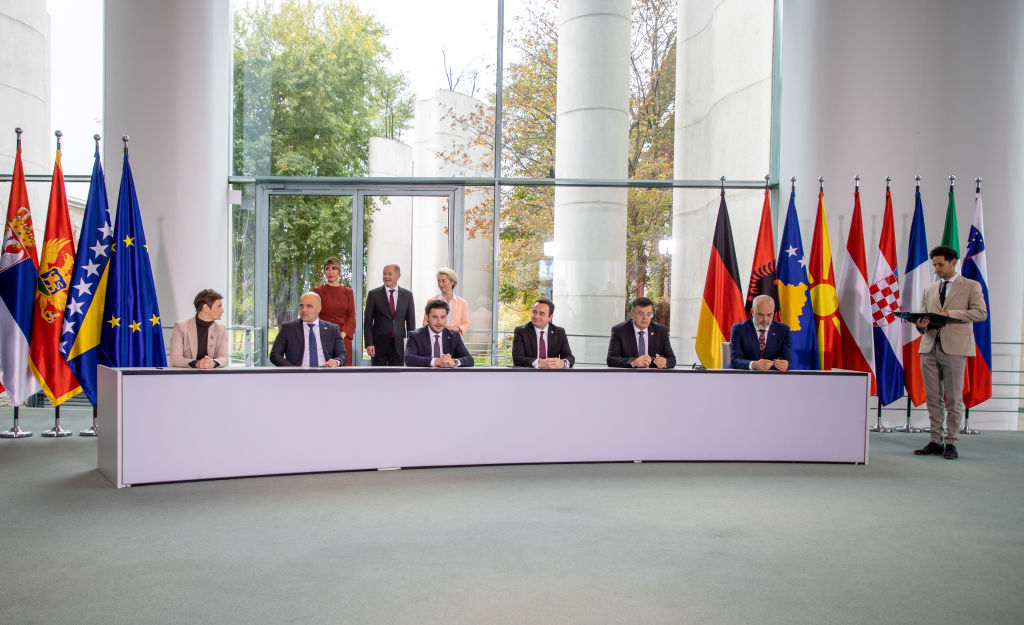European Commission President Ursula von der Leyen and German Chancellor Olaf Scholz looked on with uneasy pride as leaders from six western Balkan aspiring EU members gathered in Berlin to sign new agreements this Thursday. British Foreign Secretary James Cleverly also attended the summit, which aims to encourage friendlier ties in this fractious region.
Agreements on the mutual recognition of ID documents and educational qualifications to facilitate travel and work should have been a moment for the Balkans to celebrate. But the mood was dampened as back in Serbia troops were deployed to the Kosovo border, the army’s alert level was raised, and a drone was shot down near military facilities at the border by Serbian forces. In a further escalation on Saturday, representatives of the Serb community in Kosovo announced their wholesale withdrawal from Kosovan institutions.
Serbia rejects accusations of sabre-rattling, but its habit of responding to vaguely defined external threats with alarming shifts in rhetoric and action sends onlookers at home and abroad into frenzied panic at regular intervals. The Serbian director of the Office for Kosovo this week claimed an increased Kosovan police presence in the north of the country constituted an attempt at a ‘silent occupation‘ of majority Serb municipalities, while the Serbian Defence Minister said ‘no one should doubt‘ the army’s preparedness to protect all Serbs, ‘including Serbs in Kosovo.’
The ever-present threat of conflict between Serbia and Kosovo, which declared independence in 2008, is largely responsible for the state of suspended animation gripping western Balkan EU membership negotiations. The possibility of a new war ties all parties into talks, for fear that a breakdown in negotiations would lead to a flare-up – but it also makes the chances of either Serbia or Kosovo ever actually joining the EU slim.
And the problem isn’t just Serbia’s attitude towards Kosovo. The country’s affiliation with Russia remains strong – in September, Serbia’s Foreign Minister agreed on ‘consultations‘ with the Kremlin on foreign policy, a move criticised by the EU and the USA. Serbia has refused to join western sanctions on Russia, although it has backed UN statements condemning the invasion of Ukraine and Russia’s annexation of four Ukrainian regions.
Meanwhile, Serbia’s animosity to Nato remains undimmed; this week, prime minister Ana Brnabić condemned a former army chief of staff who dared to ‘openly advocate for Serbia’s membership of Nato, the same Nato that attacked our country in 1999.’
The Ukraine war has widened the ideological chasm separating Belgrade and the West. In the run-up to the summit this week, a German government official said the time has come for Serbia to finally choose between Russia and the EU, saying Serbian President Aleksandar Vučić ‘will have support from the EU as a whole if he takes the path to Europe but ‘should he choose the other path, it will have ensuing consequences.’
It might be tempting to see this as the EU once again pressuring an eastern European country into obedience, but the situation is different to disputes over sovereignty with rebel member states Hungary and Poland. Gripes with those countries concern their alleged failure to uphold shared values – but Serbia’s government gives little indication that it shares much with the EU at all, beyond the wish to become more economically prosperous.
And it’s not just politicians; polls show that a majority of Serbs don’t want to join the EU anymore, especially as the bloc makes accepting Kosovo’s independence more clearly a condition of Serbian membership.
In the unlikely event that Serbia does become an EU member, the gaping chasm in perceptions of geopolitics would cripple the bloc’s decision making in foreign and security policy, which currently depends on unanimity. Critics who portray Hungarian Prime Minister Viktor Orbán’s nationalist stance as an unreasonable obstacle to the EU should wait and see what welcoming Serbia into the fold would do.
This may be a vital, if unspoken, reason for the recent drive by Scholz and von der Leyen for the EU to switch to majority voting when it comes to foreign policy. Abolishing member states’ veto rights would allow the EU to keep expanding to Serbia and other ideologically incompatible countries, while simply overriding their likely objections to European resolutions. But is it fair to ask existing member states to sacrifice more of their own national sovereignty simply so that the bloc can absorb problematic countries like Serbia?
Meanwhile, new tensions on the Serbia-Kosovo border suggest that even the holding pattern of peace sustained by EU membership talks might be wearing thin. If the situation doesn’t improve, Brussels may soon have to consider calling time on the charade of Serbian EU accession.







Comments